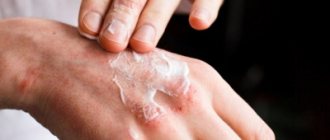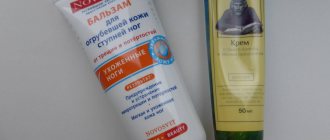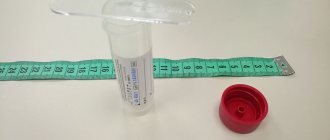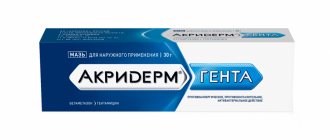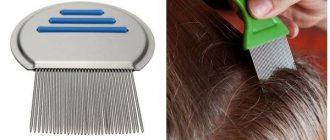April 27, 2020
Regular treatment with ointment is one of the mandatory methods of treating psoriasis on the arms, legs, face and other parts of the body. The oily texture of such external products allows the active ingredients to remain on the skin for a long time, which makes them more effective than creams and gels.
The list of ointments for psoriasis includes two main types of products:
- Hormonal. They can bring good results, but have many side effects.
- Non-hormonal. Less effective, but safer compared to hormonal ones.
Hormonal ointments for psoriasis
The active components of hormonal ointments are glucocorticosteroids - hormones that can suppress the activity of the immune system and reduce inflammation. Most often, such ointments contain the following components:
- Hydrocortisone: Laticort, Oxycort, Hydrocortisone.
- Triamcinolone: Triacort, Fluorocort.
- Betamethasone: Beloderm, Akriderm, Celestoderm.
- Clobetasol: Powercourt, Cloveit.
- Methylprednisolone: Campoderm, Advantan.
The only advantage of hormonal ointments is the rapid appearance of results. There are many more disadvantages, and these include:
- getting used to it over time;
- presence of withdrawal syndrome;
- serious side effects;
- impossibility of using long-term courses;
- influence on hormonal levels;
- risk of relapse after discontinuation of the drug.
Dermatologists do not recommend the use of hormonal ointments if more than 20% of the skin is affected. Also, do not apply them to areas of sensitive skin: in the neck, skin folds, face, areas of diaper rash. Such drugs cannot be used without a doctor's prescription, even if they are sold without a prescription. Due to uncontrolled use, the functioning of the adrenal glands may be disrupted, which will lead to serious problems and diseases.
Results
Psoriasis is a systemic disease that manifests itself not only on the skin.
Affects the nervous, endocrine, and immune systems. This disease disrupts the functioning of the adrenal glands, liver, and metabolic processes. Therefore, it is necessary to treat comprehensively, to influence those organs that are not working correctly. Psoriasis is not contagious. Some types of psoriasis can be treated at home : vulgar, seborrheic, palmoplantar, guttate. And also psoriasis on the elbows, legs, face, head.
How to treat psoriasis at home? Methods:
- ultraviolet 311 nm;
- tablets for psoriasis;
- external agents (ointments, creams, gels);
- shampoos for the treatment of psoriasis on the head;
- folk remedies (external and internal).
For the treatment of psoriasis in no more than 20% of the body, a complex: ointment (shampoo) and ultraviolet 311 nm gives good results. Persistent remission is observed after 2-3 months of treatment.
With the severity of the disease, where the disease has spread to more than 20% of the body, you need to consult a doctor. A competent dermatologist will select a treatment package and the required dosage of medications.
Non-hormonal ointments for psoriasis
Non-hormonal agents are considered moderately effective and at the same time inexpensive ointments for psoriasis. Their advantages compared to hormonal ones include:
- relative safety;
- lack of addiction;
- lower cost;
- possibility of long-term use without harm to health;
- no serious side effects;
- preservation of hormonal levels;
- no load on the liver and kidneys;
But even with all the advantages, non-hormonal ointments for psoriasis cannot be called truly effective. Unlike hormonal ones, they have a much weaker effect. Their effect does not appear so quickly, so they are prescribed only for mild manifestations of psoriasis. They are also considered safer for the treatment of psoriasis in children.
Non-hormonal ointments eliminate peeling, swelling, itching, relieve inflammation and irritation. In addition, despite the safer composition, the use of such drugs does not exclude the development of an allergic reaction if a person is intolerant to one or another component.
Depending on the effect they provide, all non-hormonal ointments are divided into several categories:
- Others: ichthyol, cartolin, grease, tar, naphthalan. They have anti-inflammatory and antiseptic effects. But it must be borne in mind that such ointments are not recommended for the progressive stage of psoriasis and for large lesions. Tar ointment is contraindicated in phototherapy because it has a photosensitizing effect.
- Herbal medicines. This includes products based on sage, celandine, aloe, elecampane and other plant components. They are considered the safest of all non-hormonal ointments. But the plant base can cause allergic reactions.
- Keratolytics: zinc, salicylic, zinc-salicylic. Their main property is the exfoliation of dead cells, which in psoriasis do not have time to be rejected. Keratolytics can cause increased inflammatory reactions, a burning sensation, and increased pigmentation of surrounding healthy skin.
Moisturizing ointments are used as non-hormonal auxiliary agents for psoriasis. But they only help eliminate the feeling of dryness and tightness of the skin.
Features of non-hormonal ointments
Salicylic ointment for psoriasis is one of the most inexpensive, but it must be borne in mind that its action for such a serious disease is often insufficient. They show good exfoliating, softening and antiseptic effects, but like other non-hormonal ointments, they take at least 2 weeks to appear, and sometimes later.
The same can be said about the use of grease-based ointment for psoriasis. In addition, these are very specific products that have a pungent odor. It can stick to furniture and clothing and is very difficult to wash off.
Among the listed ointments there are no those for the use of which clinical trials have been conducted. This means that their effectiveness is only confirmed by the experience of some users. Clinical trials were carried out only on the following drugs:
- as Pimecrolimus (Elidel cream);
- Calcipotriol (Davonex);
- Zinc pyrithione (Zinocap).
This suggests that their use can indeed be beneficial. But Pimecrolimus, if used uncontrolled, has a risk of infection, and Calcipotriol should not be used if more than 30% of the skin surface is affected, as this can lead to hypercalcemia.
The only extremely safe remedy remains zinc pyrithione. Thus, answering the question of which ointment is best for psoriasis, we can say that Zinocap. But this does not negate the fact that its effect is still weaker than that of hormonal drugs.
Etiology of the disease
This disorder is characterized by hyperproliferation of epidermal keratinocytes with a shortened life cycle of epidermal cells. The exact causes of psoriasis are unknown. Presumably, environmental, genetic and immunological factors play a role in the pathological process.
Environmental factors
Triggers for exacerbation of the skin disease psoriasis can be many factors, including exposure to cold, trauma, the use of certain medications (for example, iodides, acetylsalicylic acid, lithium, beta blockers), withdrawal of corticosteroids, infectious processes, including streptococcal and staphylococcal .
In addition, the role of sunlight, elevated air temperature, and pregnancy has been identified in the manifestation of psoriasis. Stress can also aggravate psoriasis. Thus, some authors suggest that psoriasis is closely related to stress disorders, which, in their opinion, is evidenced by increased concentrations of neurotransmitters in psoriatic plaques [2]. In some cases, psoriasis flares up for an unknown reason that cannot be explained by traditional psoriatic triggers.
Genetic factors
Undoubtedly, a hereditary factor plays an important role in the development of psoriasis, in particular, the presence of certain chromosomal loci in the HLA (Human Leukocytes Antigens) system [3]. Genomic analysis made it possible to differentiate 9 different gene loci, which were called “psoriasis susceptibility genes” (PSORS, psoriasis susceptibility genes). They were numbered from 1 to 9: PSORS-1, PSORS-2, etc.
The main gene that determines the hereditary tendency to develop psoriasis is considered to be PSORS-1, located on chromosome 6. Three genes in the PSORS-1 locus are associated with the development of psoriasis, and one of the most common is the allelic variant of the human leukocyte antigen HLA-Cw6. With this allele, there is often a family history of psoriatic disease, early onset of the disease, and psoriatic arthritis.
Another factor associated with psoriasis is obesity, in the development of which hereditary predisposition also plays a role. It is well established that with an increase in body weight, the course of psoriasis worsens, and with a decrease, remission occurs.
Immunological factors
Psoriasis is an autoimmune disease. The pathology is directly related to excessive T-cell activity. Studies also show increased levels of the pro-inflammatory cytokine tumor necrosis factor TNF-alpha in psoriasis patients.
Patchy psoriasis (the most common form) often develops after certain immunologically significant events, such as streptococcal pharyngitis, withdrawal of steroid therapy, and use of antimalarial drugs.
Which ointment to choose
Only a professional dermatologist should decide which ointment to treat psoriasis. His task is to choose the safest and at the same time effective drug. For more than 25 years, the PsorMak clinic has been practicing treatment with ointment against psoriasis, made according to the original recipe. There are no hormonal components in the composition, which provides the product with the following advantages:
- Possibility of use by children and pregnant women;
- absence of withdrawal and addiction syndrome;
- mild impact without provoking relapses;
- no contraindications.
But our specialists understand that even the most effective ointment for the treatment of psoriasis must be suitable for the patient. Therefore, before prescribing, we make sure to conduct a complete diagnosis.
In addition, an integrated approach is important in the treatment of psoriasis.
In this regard, our dermatologists develop an individual diet for the patient, and, if necessary, provide a referral for acupuncture and psychotherapy. If you want to achieve a long-term relapse and stop struggling with unpleasant symptoms every day, sign up for a consultation at PsorMac and we will select an individual treatment regimen for you. April 27, 2020
Author of the article: dermatologist Mak Vladimir Fedorovich
Psoriasis on the scalp: treatment at home
Shampoos are intended for the treatment of psoriasis on the scalp. The most effective of them, according to reviews and recommendations of doctors, are:
Shampoo "Skin-cap"
A medical study showed results in 83.3% of cases, the reviews were positive.
Shampoo "Skin-cap"
Shampoo "Psorilom"
Reviews about the product are positive, there have been no studies. The product has a completely natural composition.
Shampoo "Psorilom"
Shampoo "Etrivex"
It has both positive reviews and recommendations from doctors. However, you need to use it at home with extreme caution - it contains a hormonal substance.
Shampoo "Etrivex"
Shampoos relieve the symptoms of psoriasis - itching, flaking. As a result, the plaques gradually disappear. However, they cause an addictive effect and only act for the duration of use.
Contraindications for each product are individual.
It is convenient to use ultraviolet 311 nm in combination with shampoos. The method gives results after 2-3 weeks of treatment and provides long-term remission of scalp psoriasis.
Types of analyzes
The main tests performed for psoriasis include:
- Skin biopsy, a piece of skin is examined to differentiate bacterial, fungal infections, and cancer.
- Complete blood count to detect leukocytosis and anemia.
- Erythrocyte sedimentation rate to determine the type of psoriasis. With pustulosis and erythroderma, the indicator remains normal.
- Uric acid test to rule out gout.
- An HIV antibody test is performed because sudden onset of psoriasis can be caused by HIV infection.
- Skin pH testing helps evaluate the effectiveness of the therapy.
If psoriasis affects the joints (arthropathic form), a rheumatoid factor test is performed. It allows you to differentiate rheumatoid arthritis, in which the protein level is increased. Contrast arthrography and pneumoarthrography also help to assess the degree of joint damage.
Risk factors (reasons for development)
Psoriasis occurs in approximately 3% of the world's population, regardless of gender. It begins at any age, but most often between 15 and 30 years. There are cases of the disease being detected in infants. The highest prevalence is among representatives of the Caucasian race, less often among the Negroid and Mongoloid races.
The disease is characterized by a wave course with periods of exacerbation and remission. Has an acute onset in most cases. A monomorphic rash of papules merges into larger plaques, which are then covered with white scales.
The etiology and pathogenesis of skin pathology have not been fully studied; both hereditary predisposition and neurogenic nature are assumed. Many patients note that the disease manifests itself and subsequently intensifies during periods of greatest stress. Some researchers believe that the cause of the disease may be an infection, but the virus has not been identified. This theory is contradicted by the fact that the patient’s immediate environment does not get sick, and the presence of psoriasis in the family history increases the likelihood of its diagnosis in descendants.


